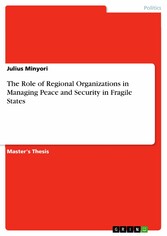The Role of Regional Organizations in Managing Peace and Security in Fragile States
von: Julius Minyori
GRIN Verlag , 2018
ISBN: 9783668835153
, 68 Seiten
Format: PDF
Kopierschutz: frei
Preis: 29,99 EUR
eBook anfordern 
Mehr zum Inhalt

The Role of Regional Organizations in Managing Peace and Security in Fragile States
Master's Thesis from the year 2018 in the subject Politics - International Politics - Topic: Peace and Conflict Studies, Security, grade: A, Cranfield University (Defence and Security), course: Security Sector Management, language: English, abstract: The conflict in South Sudan manifested on the 15 December 2013 and the regional organization IGAD moved quickly to manage it by establishing several structures that included the Cessation of Hostilities agreement and the Status of Detainees Agreement. However, the process of negotiating enduring peace and security in the country have proven elusive. Despite concerted efforts by IGAD, AU and even the UN, peace has remained elusive for the people of South Sudan. This research employs the neoliberal institutionalism theory to try and explain the reasons for this failure. It identifies weaknesses that range from conflicting interests of the IGAD member states, to egotistical competitions among the negotiators and lack of understanding of the problem. The attempt to recalibrate the new security problems in the manner of the comprehensive Peace Agreement that brought an end to the Sudan war, can be seen as a failure to appreciate the new conflict dynamics that drive the ethnic war currently ongoing in South Sudan. Moreover IGAD has had a checkered history in peace and security and although it was hoping to use this experience in South Sudan, it failed to evaluate and resolve the South Sudan on its own merit. Thus in conclusion, we find that no conflicts are alike and any attempt to use a template will most likely fail.











